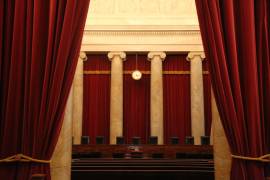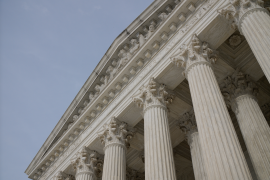
After Scalia
Blog Search
With the sudden death of U.S. Supreme Court Justice Antonin Scalia this past Saturday, the attention of the nation has focused like a laser on the Court – its composition, the docket of cases now before it and the historic process ahead of Justice Scalia’s successor being nominated and confirmed.
In his 30 year tenure, Justice Scalia certainly left his mark on the Court, and the laws that impact the way people live every day. From his defense of rights of free speech and against unreasonable search and seizure, to his heated and harmful opposition to equal rights for LGBT people and people living with HIV, as well as to racial and reproductive justice, Justice Scalia certainly will go down in history as one of the Court’s most conservative, outspoken and angry voices.
Given that Justice Scalia also was well-known for lauding the “originalist” view that what matters most are the words of the Constitution and what they meant at the time it was ratified, it besmirches his memory to have members of the Republican leadership in Congress immediately question a sitting president’s entitlement to exercise a right explicitly guaranteed by the Constitution – to nominate justices to sit on the Supreme Court.
Senators McConnell, Cruz and Rubio, issued statements within hours of the announcement of Justice Scalia’s death that they will oppose any nominee made by President Obama, even before knowing who it may be, because they believe the next president, not our current one, should get to appoint Justice Scalia's successor. Referencing the nation’s shameful legacy of counting African American slaves as less than a full person, acerbic tweets questioned whether those Senators believe that Black presidents only get three-fifths of a term. At a minimum, they seemed to have forgotten that Justice Kennedy was appointed to the Court after being confirmed during the last year of President Reagan's term – a confirmation voted for by Senator McConnell. Sixteen other Supreme Court justices likewise were appointed during the last year of a president's term – including six since 1900.
The Senate gets to advise and consent on who becomes a federal judge, but it would be a craven abuse of senators' constitutional role to block any appointment for eleven months because they do not want a sitting President – who was re-elected by the nation to fill a second four (not three) year term -- to put forward a nominee to be judged fairly rather than rejected out of hand on partisan grounds.
Justice Scalia’s death brings to 82 the number of open seats on the federal judiciary. Thirty-one of those federal seats have been vacant for so long, and the caseloads so high, that they have been classified as “judicial emergencies.” When Donald Trump urged the Senate on Saturday to “delay, delay, delay” in voting on a nomination, he was simply describing what has already been a shameful record of Senate attempts to limit the right of our nation’s duly-elected chief executive to fill judicial vacancies, subject only to Senators’ approval of their qualifications.
Last year, the Republican-controlled Senate confirmed just 11 federal judges, the fewest since 1960. Only one court of appeals judge was confirmed, the worst record since 1953. All told, it took these 11 judges an average of 283 days from their initial nomination to their final confirmation. There is too much at stake to countenance such obstructionism any longer.
President Obama has stated that he intends to name a nominee after the Senate returns from its current recess. We at Lambda Legal call upon those in the Senate to do their job and, as the President has urged, “give that person a fair hearing and a timely vote.”
The Constitution embodies and seeks to safeguard our nation’s highest values, including a commitment to protecting individual rights against overreaching majority will. We need a nominee and a new justice who understands and will enforce that commitment. We need someone who will be fair-minded and approach the decisions they make without the pre-judgment modeled by some senators. The judicial philosophy of any nominee also must include a commitment to render decisions impartially and in accordance with the Constitution and the laws of the United States, not based on politics.
Moreover, in order to ensure that the best possible candidate is put forward, we trust that President Obama will again look broadly in seeking the right nominee. While he has made important strides, people of color and women continue to be underrepresented at all levels of the federal judiciary, and there is still only one “out” LGBT judge on any federal appellate court. President Obama has appointed two justices to the Supreme Court who have greatly diversified the character of the body. We hope that his next appointee will expand that base even further, and that the Senate will rise above the knee-jerk response of some of its members to ensure this country has the full deliberative judicial body it deserves.




